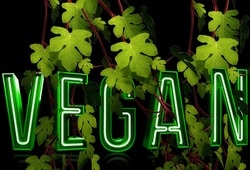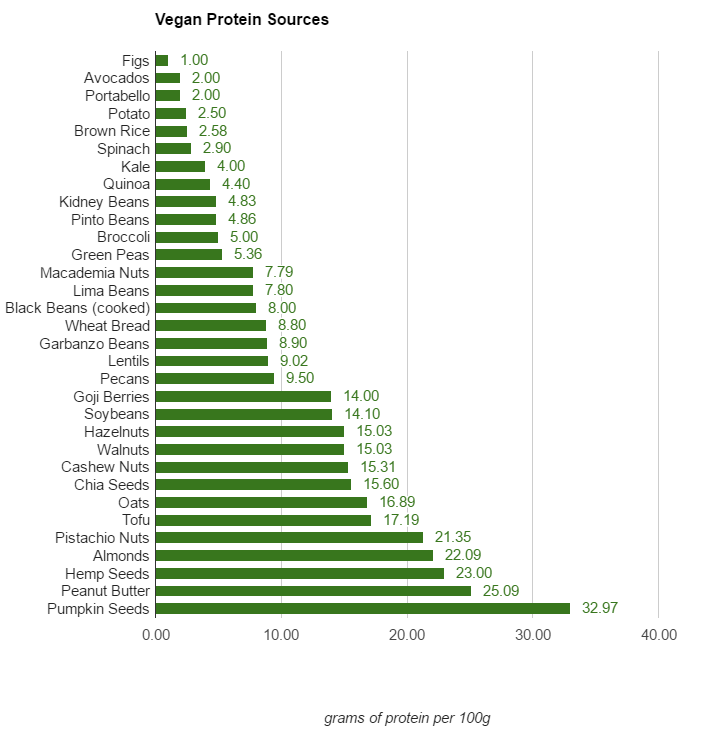 Vegans who workout need protein! Fortunately, this is becoming more common sense knowledge. However, it wasn't always that way. When I became a vegan in 2005 there was still a lot of misinformation floating around about how humans don't really need much protein. This was primarily a knee-jerk reaction to the large amount of animal protein that the average American consumed. It was intended to help would-be vegans justify to their family and friends that they would be OK without their animal sources of protein.  Slowly, over the years, as the numbers of vegan endurance and strength athletes increased, it became evident that to continue performing or competing at the highest level, they needed ensure they were getting sufficient quantities of protein in their diets. The shift toward more natural foods also helped as it highlighted minimally processed foods that are low on the food chain, and raised the awareness of nutritional content of foods. Because we live in a society of quick fixes and on-the-go eating, it didn't take long before some enterprising individuals and corporations figured out that there was an untapped market, and vegan started to go mainstream. Where the options used to be wholesome foods that took time to prepare, now, even big-box grocery stores (at least here in Southern California) carry a wide variety of vegan processed foods and there are even chains of vegan "burger" restaurants that serve up vegan versions of all the fast-food nightmares Even though highly processed, nutritionally stilted food options seem to be proliferating, many have come to realize that these foods aren't good for our health. The same is true for many of the vegan options available in the grocery stores and restaurants. Just because something is vegan doesn't mean it's good for you. For the sake of convenience, that vegan item could be highly processed, high in sugar, salt, and fat, or filled with chemically processed isolates. In reality, we need to reconsider the price of convenience. It is better for our bodies, our minds and our planet when we eat closer to nature, with some supplementation and an occasional "treat". This way we ensure both our nutritional and psychological needs are met.
So, what does that mean for protein? First, we need to have an understanding of how much protein is required. The USDA's Recommended Dietary Allowance says that relatively sedentary human adults need 0.36g of protein for each pound of bodyweight (0.8g per kilogram of bodyweight). However, the problem with this calculation is that it actually doesn't provide enough protein for relatively active to athletic adults. Considering that a 150 lb adult eating a 2000 calorie diet would only receive 53 grams of protein per day. At 4 calories per gram of protein, those 53 grams of protein equal 212 calories, or only about 10% of total daily calories. That's at the low end of the well publicised goal of 10-35% of daily calories from protein. Factor in an active or athletic adult who is burning an additional 1000 calories per day, and the percentage of calories from protein falls even lower. According to Nancy R Rodriguez from the Department of Nutritional Sciences at the University of Connecticut, Storrs, CT, (Am J Clin Nutr June 2015 vol. 101 no. 6 1317S-1319S) the average relatively sedentary individual should be targeting closer to 0.45g-0.68g of protein per pound of bodyweight (1g-1.5g per kilogram of bodyweight). Some studies have shown that this level of protein intake may result in reduced risk of chronic diseases, better weight management and body composition, adherence to a weight loss programs, and importantly, may slow or prevent the progression of sarcopenia (age-related muscle loss) in active older adults. With the argument made for additional protein consumption, the difficult part comes into focus. How do you get the added protein in your diet. For omnivores (people who eat animals, vegetables, fruits and dairy products.) it's pretty easy. But for vegans, unless you eat a lot of those highly processed foods, you'll have a much more difficult time. In the chart below I've listed out a wide variety of vegan protein sources and the number of grams of protein per 100g of the food. Eating more seeds, nuts, and beans is the most obvious choice, but that also has the side effect of getting higher amounts of fat and total calories. For example, while 100g of almonds provides just over 21g of protein, it also provides about 500 total calories. This is where I believe that supplementation comes in. There are a variety of high-quality vegan protein supplements available. While they're still highly processed in comparison to whole foods, many vegan protein powders avoid unhealthy chemically processed isolates, and high sugar contents. My personal favorites include Vega One All-in-One Nutritional Shake, Vega Sport Performance Protein Powder, and Garden of Life Raw Fit Protein Powder. If you're a vegan, I strongly suggest you research your protein needs and discuss protein supplementation with a registered dietitian. I have a network of vegan RDs that I can refer you to as well as provide you with further information. Feel free to contact me by clicking on the CONTACT button.
0 Comments
Leave a Reply. |
Personal Trainer, Health Coach, Skydiver, Mountain Biker, Road Cyclist, Vegan, Medical Device Systems Engineer. |

 RSS Feed
RSS Feed